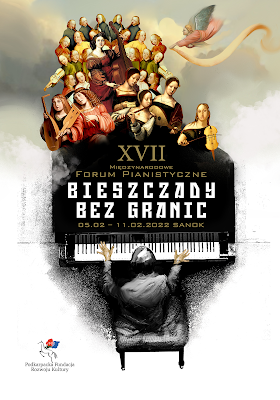Around Józef Elsner Warsaw, 6-8 September 2019
Friday, 6 September, 7:00 pm
The Royal Castle – Great Hall
Plac Zamkowy 4
Józef Elsner – A Pole by Choice
Józef Elsner (1769-1854) was not only a composer and teacher of Chopin but founded the Warsaw Conservatory not long after the first European music Conservatory, the Conservatoire National de Musique, was founded in Paris. He contributed an inestimable amount to the growth and development of music in Poland as part of a more general education at the Main School of Music, a part of the Warsaw University. Elsner was a respected composer of opera and chamber music, grounded in the classical Germanic musical tradition through his studies as a young man in Breslau (Wroclaw) and Vienna. Most interestingly he was deeply influenced by the educational methods of the Swiss Johann Heinrich Pestalozzi. He treated education as the planting and growth of a 'seed' that developed organically within the student. This was Elsner's attitude to Chopin, to let him go his own way. Balance the hands, heart and head.
Józef Elsner (1769-1854)
Piano Sonata in B flat major
Rondo á la mazurek in G minor
Polonaise in B flat major
Krzysztof Książek – piano
As a foreign Westerner, being unfamiliar with these works, I would rather not provide a detailed analysis of each piano work, suffice to say many were graced with spirited with cheerful themes. The works progress according to expected conservative tonal schemes. The Adagio of the sonata certainly did not possess anything resembling the poetic content of his pupil Fryderyk Chopin. I feel one must remember that Elsner was a violinist and not an exceptional pianist and this is reflected in these works. The style brillant of the day was reflected and some polyphony was present. These pieces cause one to reflect on the nature of genius as opposed to great talent - a canyon yawns between them. Perfectly competent works with an unashamed nationalist spirit as is only to be expected given the partitioned country erased from the map of Europe and existing only in the minds of its citizens.
I felt Książek, through unfamiliarity with the music perhaps, was lacking in the possible expressiveness contained within these works, which may have lifted them out of the feeling of 'worthy' rather than 'inspired' creations.
Variations in B-flat major on the march from the opera The Interrupted Sacrifice by Peter Winter
This work had an attractive virtuoso character with a degree of expressiveness - the 2nd variation was rather attractive.
Rondo á la krakowiak in B flat major
Polonaise in F minor
Aleksandra Świgut – piano
Aleksandra Świgut – piano
These works were enhanced by rather attractive themes which captured the nature of the dance. the F minor Polonaise had an interesting conclusion that was harmonious and pleasant. Aleksandra Świgut gave them great credibility and clearly enjoyed playing what must have been almost unfamiliar music.
Intermission
Sonata for Violin and Piano in F major, Op. 10 No. 1
I felt these works were far superior to the solo piano pieces, although never rising above what might have been heard by the cognoscenti in the Bath Assembly Rooms or at Baden-Baden in the gaming rooms - and none the worse for that as long as higher claims are not made for this delightful salon music. This young duo were treated with great affection by the audience for their efforts with this unfamiliar music which they perhaps learned for this concert.
Sonata for Violin and Piano in D major, Op. 10 No. 2
A lively but rather uninspired work, at least in this performance. I found it had a rather simplistic melody that became very animated with moments of some lyricism. The themes are relatively charming but rather naive and unsophisticated for my taste. I cannot become emotionally engaged with this studious, predictable music.
Aleksandra Kuls – violin
Krzysztof Książek – piano
6 Polonaises for piano 4 hands
Aleksandra Świgut – piano
Krzysztof Książek – piano
These polonaises possess what might be termed 'provincial grandeur' if that does not sound too patronizing. No deep expressiveness here. Perhaps this merely indicates, in comparison, the true universal grandeur of the genius of the Chopin heroic polonaises - all masterpieces of immense emotional range and musical complexity.
Elsner's final report on Chopin: 'Remarkable Aptitude, A Musical Genius etc. …'
* * *
Sunday, 8 September, 6:00 pm
The Museum of King Jan III’s Palace at Wilanów, Orangery
Stanisława Kostki Potockiego 10/16
Józef Elsner and his Pupils
Józef Elsner (1769-1854)
Piano Quartet in E flat major, Op. 15
Łukasz Krupiński – piano
Marcin Markowicz – violin
Artur Rozmysłowicz – viola
Maciej Młodawski – cello
Józef Nowakowski (1800-1865)
Piano Quintet in E flat major, Op. 17
Łukasz Krupiński – piano
Robert Kwiatkowski – violin
Artur Rozmysłowicz – viola
Maciej Młodawski – cello
Tomasz Januchta – double bass
Intermission
Ignacy Feliks Dobrzyński (1807-1867)
String Quintet in F major, Op. 20
Robert Kwiatkowski – violin
Marcin Markowicz – violin
Artur Rozmysłowicz – viola
Maciej Młodawski – cello
Marcel Markowski – cello
Józef Władysław Krogulski (1815-1842)
Piano Quartet in D major, Op. 2
Łukasz Krupiński – piano
Robert Kwiatkowski – violin
Artur Rozmysłowicz – viola
Maciej Młodawski – cello





Comments
Post a Comment